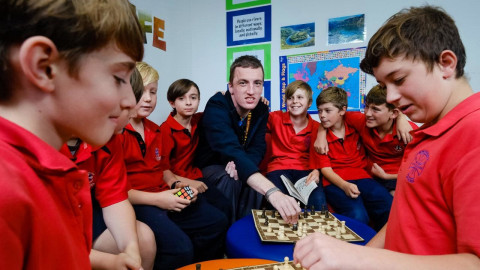
The images cramming the frames of Harrison Fischer’s first years are of a happy child, but one often distracted by commands only he could hear.
At two he wasn’t walking and had no language. He was restless, unsleeping, would turn lights on and off, taps too, and endlessly spin things — like the tops of pots — and scratch glass.
He was in and out of hospital with various illnesses, real and imagined. His various toddler milestones went unmet. But none of the doctors or nurses to whom Harrison’s mother, Judy Brewer, took the youngster, identified what might be wrong.
More than one almost blamed Harrsion’s parents: it was their lifestyle, they lived remotely, had busy lives. And that was true.
By then, Harrison was days off turning three, and his parents were at their wits’ end. They didn’t know it, but unwittingly they’d been circling the problem.
A Canberra childcare worker threw them a clue: “Look, I’ve seen this before. He’s got a developmental issue.” The young woman had chipped away a stone of hope from a stubborn escarpment of despair. By then living in Canberra, Judy booked in to see a developmental paediatrician — not something she could have done in many parts of rural and regional Australia where they had been living.
“I had this long list (of Harrison’s behavioural traits). I said to her, ‘I know there’s nothing you can say to explain all this’.”
The paediatrician said that actually, there was: autism.
It was the first time anyone had mentioned that word. As 1996 drew to a close so too it seemed had Harrisons’ future.
“I went home with Harrison, a three-month-old (Harrison’s brother Dominic) and a piece of paper with a range of stick figures on it asking does your child do this? We went tick, tick, tick, tick, tick. We knew instantly that was what it was,” Judy said.
Judy and her husband were told that, at worst, their first born had a lifelong disability, would struggle at school, would never live independently or have a job. “He’ll be with you for the rest of your life.”
Judy felt helpless. But she thought about how other parents given that news must feel. Hers was an educated family of means and with contacts. He husband, Tim Fischer, was the deputy prime minister of Australia.
She vowed then that Harrison’s would not be an unnoticed life on the periphery of a society that mostly misunderstood and marginalised those with autism.
These days, Harrison is 24, employed, and living on his own in a flat in Wodonga on the Victoria-NSW border.
“It’s pretty good going to work,” Harrison said of his role at St Monica’s Primary School in Wodonga. “I’ve had the job for 4½ years now — a little more than 4½ years,’’ he adds with a precision that can be a feature of those with autism.
“I am one of their computer people. And I am involved in a lot of chess-related stuff. I really enjoy it (the interaction with colleagues). My colleagues are all good friends.”
He can occasionally go a week without seeing his mum and dad. But he needs help getting organised in the morning “for an hour and a half or so”, Judy said.
“For 105 minutes!” Harrison corrects her.
Nonetheless, his life is an unambiguous triumph over a system few back then ever defeated.
Which is why, when his family first heard of plans for the National Disability Insurance Scheme, they became outspoken supporters, believing it would give hope to many thousands like them who lived with autism and despair.
“When we heard of the NDIS we thought ‘that’s what we need’,” said Judy, who writes of her family’s experiences in The Australian today. “I didn’t want our son in a medical system or a welfare system. I wanted him to be given the support he needs to live a full and happy life. There was nothing that allowed that until the NDIS.”
Her husband also attended rallies in support of the campaign for the NDIS. But they believe the scheme has lost its way.
“Look, it’s a major policy reform and it has been rushed. Families are scared that the rules are going to be changed and that the promise of the NDIS is not going to be reached,” Judy said.
Those putting shape to the NDIS have “had very poor advice around autism”.
“They expected the numbers for autism to be much, much less,” Judy said.
So what would the former deputy PM say to today’s Prime Minister?
“Autism needs … more research to develop the right sort of templates that will make a difference … to the autistic of Australia with the essential aim of putting them on the pathway to relative independence,” Tim Fischer said.
He would tell the Prime Minister that this would be “an investment in our immediate economic future. Quick results if we invest in the right things”.